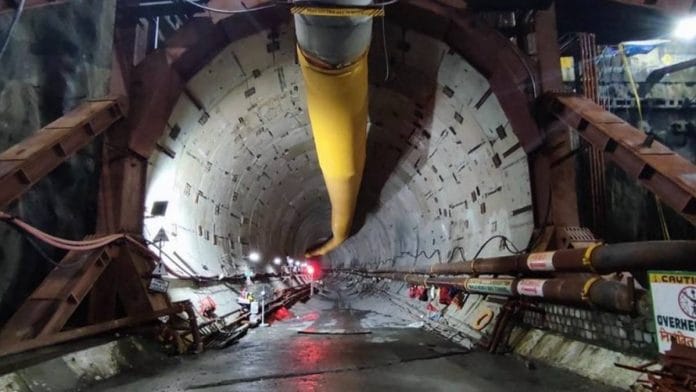New Delhi: A report by the Comptroller and Auditor General (CAG) of India has flagged alleged lapses in the environmental clearance process for several coastal projects, calling it a “large-scale” violation of the laws governing India’s coastal ecosystems.
The CAG report, tabled in Parliament on 8 August, said multiple projects had been awarded clearances without having adequate checks and balances in place.
The projects named include the Adani Petro Port in Gujarat, the Mumbai Coastal Road, the Mumbai Trans Harbour Link, expansion of facilities in a port by Redi Port Limited in Maharashtra, and the deepening of an approach channel in Goa’s Mormugao Port.
The alleged violations cited include the use of outdated data to grant clearances, not thoroughly evaluating the environmental impact of projects, and a lack of compliance with the terms of clearance granted to some projects.
The scale of these violations made it “imperative to assess the implementation” of the coastal regulation zone notifications of 2011 and 2019 — legislation designed to regulate activities in coastal areas — the CAG said in its report.
Between 2015 and 2019, the Union environment ministry awarded clearances to 210 projects, while state bodies granted clearances to 1,978. The CAG sampled some of these projects to draw its conclusions, also inspecting clearances from 2020.
According to the report, the ministry was given access to the CAG’s findings in December 2021, but “despite repeated requests”, no responses were received.
When contacted, a spokesperson for the ministry told ThePrint that no comment or statement could be shared at the moment.
Also Read: Sea link to coastal road—Mumbai’s relationship with its sea is changing
What the report found
In pre-audit studies, the CAG said it found incidents of “illegal construction activities (reducing coastal space), effluent discharges from local bodies, industries, and aquaculture farms”.
The Coastal Regulation Zone (CRZ) Notification of 2019 (revised from the 2011 and 1991 versions) manages activities along India’s coasts by dividing them into different zones. India’s coast is 7,516-km-long and is managed by an institutional framework that is covered at a national and local level.
Only permitted activities are allowed in these zones.
At the central level, the implementation of the CRZ notification is handled by the National Coastal Zone Management Authority. At the state level, it is the responsibility of the state/Union territory coastal zone management authorities, which branch out into district-level committees that exist wherever the CRZ notification is applicable.
The CAG said that the National Coastal Zone Management Authority was functioning as an “ad hoc” body and hadn’t been made permanent, leading to a “lack of continuity of approach towards coastal conservation issues”.
The CAG also noted that many state-level coastal management authorities were reconstituted months after their terms had expired. In Karnataka, the State Coastal Zone Management Authority (SCZMA) was reconstituted 11 months after its last term expired in March 2020, it said, adding that delays were recorded in Kerala, Andhra Pradesh, Goa, Odisha, and West Bengal as well.
Several of these states had failed to constitute district-level committees (DLCs), the CAG added. Tamil Nadu’s DLCs failed to include the inputs of local traditional communities, the report said.
The CAG also said projects had been given clearances despite “inadequate environment impact assessments (EIA)”.
The EIA is a process through which the potential environmental impact of a project is assessed, based upon which clearances are given. Project proponents (the entity primarily responsible for a specific project) can hire external consultants to carry out the impact assessments for them.
Some projects such as the construction of the Moti Mahal Hotel in Mangaluru, Karnataka, and the laying of the Mahanagar Gas Ltd liquefied natural gas (LNG) pipeline in Maharashtra were given clearances even though the consultants were not licensed to carry out the EIA, the report says.
The CAG further found at least 12 examples of projects whose EIA allegedly relied on outdated data. These include the Mumbai Coastal Road project as well as the Mumbai Trans-Harbour Link (MTHL) — both of which are projects that received widespread criticism for their potential adverse effects on the environment.
Fourteen other projects were given clearances even though their EIA “failed to identify key biodiversity in the area and did not include mitigation measures to alleviate the risks faced by the unique biodiversity”, the report says. These include the aforementioned Redi Port Limited and Mormugao Port projects.
Projects such as the setting up of an International Leather Complex by Adani Port and SEZ Ltd as well as an effluent discharge system by Hyacinths Pharma Pvt Ltd in Andhra Pradesh failed to produce a cumulative study to assess their impact on marine life, as mandated by CRZ 2019 notification, the CAG said.
“Despite serious reduction and degradation of the live coral cover in the Gulf of Mannar islands, no viable strategy to mitigate the propagation of the invasive species had been devised by the Department of Forest, Tamil Nadu,” the CAG report added.
How to remedy the situation
Foremost in the CAG’s recommendations is to make the national and state coastal zone management authorities permanent bodies and to reconstitute district-level committees without delay.
The CAG has also called for the clearance process and the implementation of the CRZ notification to be more transparent in terms of sharing minutes of meetings in a timely manner.
“The ministry may ensure that the project proponent carry out [an] in-depth ecological evaluation of the project environment before granting the clearances to the projects as well as enforce the practice of cumulative assessments already defined in the EIA notification, 2006,” the CAG said.
(Edited by Uttara Ramaswamy)
Also Read: These are the 7 criteria Modi govt will use for ranking states on environment clearance






